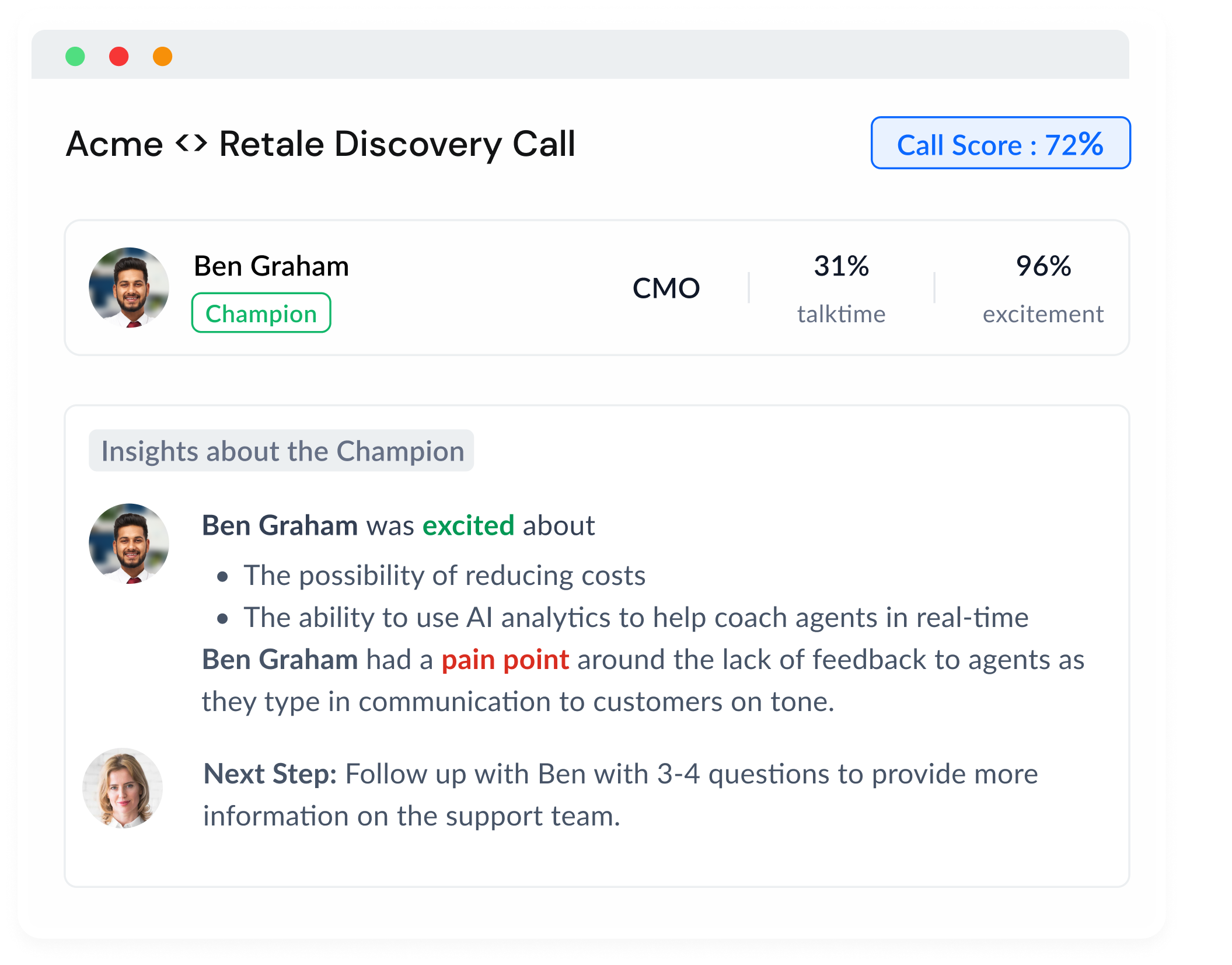Tired of using the same old sales strategies that produce little to no results in enterprise deals?
Enterprise deals are a beast of their own, and any company that’s trying to build a scalable sales motion within enterprise needs to re-engineer parts of their sales process to be able to adapt to the demands and challenges of enterprise sales. Yes, it’s very different from SMB or mid-market, and that’s where the Miller Heiman Sales Process comes in.
What is the Miller Heiman sales process?
The Miller Heiman Sales Process is a proven, structured approach to selling that focuses on understanding customer needs and aligning them with the seller's solutions. Developed by Robert B. Miller and Stephen E. Heiman, it provides salespeople with a methodology to build and maintain strong, long-lasting relationships with clients. The Miller Heiman Sales Process consists of the following key elements:
- Strategic Selling: This aspect of the Miller Heiman Sales Process emphasizes the importance of understanding the customer's unique decision-making process, identifying key decision-makers, and developing relationships with them. The goal is to position your offering as the best solution to the customer's specific needs.
- Conceptual Selling: Conceptual Selling is built on the idea that customers buy for their reasons, not yours. This part of the process encourages salespeople to ask open-ended questions, actively listen to customers, and uncover the client's needs, issues, and concerns. By understanding the customer's concept or perception of value, you can tailor your sales approach and solutions accordingly.
- Large Account Management Process (LAMP): LAMP is designed to help sales teams develop long-term strategies for managing and growing their most important accounts. It involves analyzing the account's potential, identifying the key stakeholders, and creating a customized plan to strengthen relationships, deliver value, and achieve mutual growth.
- SPIN Selling: This approach, developed by Neil Rackham, complements the Miller Heiman Sales Process. SPIN stands for Situation, Problem, Implication, and Need-Payoff. It's a questioning technique that guides salespeople through identifying customer needs and demonstrating how their product or service can effectively address those needs.
The Miller Heiman Sales Process is widely adopted across industries and is known for fostering a consultative approach to selling, helping salespeople build trust, deliver value, and create lasting customer relationships.
The Fundamental Principles of Miller Heiman Sales Process
The Miller Heiman Sales Process is based on several fundamental principles that promote a customer-centric approach to selling. These principles aim to help sales professionals build strong, long-lasting relationships with clients by focusing on their needs and delivering value. The key principles include:
- Focus on the customer: The process emphasizes understanding the customer's unique needs, requirements, and decision-making processes. Sales professionals should prioritize the customer's perspective and prioritize their needs over simply pushing a product or service.
- Build relationships: Developing strong relationships with key decision-makers and influencers within the client's organization is essential. By establishing trust and rapport, sales professionals can position themselves as reliable partners rather than just another vendor.
- Understand the decision-making process: Sales professionals must gain insights into how the customer makes decisions and identify the key stakeholders involved. This helps them tailor their approach and present their offerings in a way that resonates with the decision-makers.
- Consultative selling: The Miller Heiman Sales Process promotes a consultative approach to selling, which involves active listening, asking open-ended questions, and understanding the customer's concept of value. This allows sales professionals to tailor their solutions to match the customer's specific needs.
- Strategic planning and execution: Sales professionals should have a well-defined plan for engaging with each client, managing their accounts, and achieving growth. This involves setting goals, understanding the competitive landscape, and identifying opportunities to deliver value.
- Adaptability and flexibility: The Miller Heiman Sales Process acknowledges that every customer is different and that sales professionals must adapt their strategies and tactics to suit the unique needs of each client.
- Continuous learning and improvement: Sales professionals should always strive to refine their skills, enhance their knowledge, and improve their sales process. This includes learning from both successes and failures, staying up-to-date with industry trends, and adapting to the changing needs of customers.
By adhering to these fundamental principles, sales professionals can effectively navigate the Miller Heiman Sales Process and improve their chances of achieving sales success.
Effectiveness of Miller Heiman Sales Process
Anecdotal evidence and case studies suggest that adopting this approach can lead to improvements in sales performance. Some metrics and areas of impact include:
- Increased win rates: By focusing on understanding customers and their unique needs, sales teams can position their products or services more effectively, leading to higher win rates in competitive deals.
- Improved deal sizes: The Miller Heiman Sales Process encourages sales professionals to pursue larger opportunities, as they can tailor their solutions to address the specific needs of each customer. As a result, average deal sizes can increase.
- Shorter sales cycles: By building relationships with key decision-makers and better understanding the customer's decision-making process, sales professionals can help shorten the time it takes to close deals.
- Enhanced customer retention: The consultative selling approach promoted by the Miller Heiman Sales Process can lead to stronger customer relationships and higher levels of satisfaction, resulting in improved customer retention rates.
- Higher revenue and profitability: When sales teams adopt the Miller Heiman Sales Process and focus on understanding and addressing customer needs, they can often achieve higher revenue and profitability.
- Greater sales team efficiency: The structured approach of the Miller Heiman Sales Process can help sales teams to prioritize their efforts and focus on the most promising opportunities, increasing overall sales efficiency.
Though there aren't specific numbers or percentages to provide a direct comparison with other sales methodologies, the Miller Heiman Sales Process has a strong reputation for delivering results across various industries. Many organizations have reported improvements in key sales performance metrics after adopting this customer-centric approach to selling.
Comparison with Other Sales Strategies and Methodologies
When comparing the Miller Heiman sales process to other sales strategies, it's clear that it has several unique advantages. For example, it's customer-centric and focuses on building relationships with key decision-makers. It's also highly adaptable, allowing sales teams to tailor the process to meet their unique needs.
When comparing the Miller Heiman Sales Process with other sales strategies and methodologies, it's essential to consider each method's unique strengths and applications. Here are some comparisons with other popular sales methodologies:
- Miller Heiman Sales Process vs. SPIN Selling
- Both methodologies prioritize understanding customer needs and adopting a consultative selling approach.
- SPIN (Situation, Problem, Implication, Need-Payoff) Selling is a questioning technique developed by Neil Rackham, which is often used as part of the Miller Heiman Sales Process.
- The Miller Heiman Sales Process is more comprehensive, encompassing strategic selling, large account management, and relationship-building.
- Miller Heiman Sales Process vs. Challenger Sale
- The Challenger Sale, developed by Matthew Dixon and Brent Adamson, focuses on teaching, tailoring, and taking control of the sales process.
- While both methodologies prioritize understanding the customer, the Challenger Sale emphasizes salespeople challenging customers' assumptions and offering unique insights.
- The Miller Heiman Sales Process is more focused on relationship-building and aligning the sales offering with customer needs.
- Miller Heiman Sales Process vs. Solution Selling
- Solution Selling, developed by Michael Bosworth, is a problem-solving approach to selling that encourages salespeople to diagnose customer pain points and offer tailored solutions.
- Both methodologies emphasize a consultative selling approach, focusing on customer needs and delivering value.
- The Miller Heiman Sales Process offers more strategic components, such as account management and decision-maker relationship building.
- Miller Heiman Sales Process vs. Value Selling
- Value Selling focuses on demonstrating the quantifiable benefits and value of a product or service to customers.
- While both methodologies prioritize customer needs, Value Selling emphasizes the financial benefits of a solution.
- The Miller Heiman Sales Process offers a broader approach, focusing on strategic selling, relationship-building, and understanding the customer's decision-making process.
Each sales methodology has its strengths, and organizations may choose one or a combination of these methods based on their unique needs and goals. The Miller Heiman Sales Process is known for its comprehensive, customer-centric approach, which can be highly effective in building strong relationships and delivering value to customers.
Which Sales Teams are Best Suited to Adopt Miller Heiman Sales Process
The Miller Heiman Sales Process is versatile and can be adapted to various industries and sales teams. However, it's particularly well-suited for sales teams that:
- Focus on complex sales: Sales teams working with complex products or services that involve longer sales cycles, multiple stakeholders, and customized solutions will benefit from the Miller Heiman Sales Process. This methodology helps salespeople navigate the intricacies of complex sales, build relationships with key decision-makers, and understand customers' unique needs.
- Engage in B2B sales: The Miller Heiman Sales Process is especially effective in the realm of B2B sales, where building relationships and understanding the customer's organization and decision-making process are crucial for success.
- Work with high-value accounts: Sales teams managing large or high-value accounts can use the Large Account Management Process (LAMP) to develop strategic plans for account growth, identify opportunities, and strengthen relationships with key stakeholders.
- Aim for long-term customer relationships: The Miller Heiman Sales Process's consultative approach helps sales teams build lasting, trust-based relationships with their clients. This methodology is beneficial for sales teams looking to retain customers and grow accounts over time.
- Operate in competitive markets: In highly competitive markets, the Miller Heiman Sales Process equips sales teams with strategies to differentiate themselves from competitors by focusing on customer needs, understanding the competitive landscape, and delivering value.
- Need a structured approach: Sales teams that require a systematic and structured process to guide their sales efforts can benefit from the comprehensive framework offered by the Miller Heiman Sales Process. It provides clear guidelines for each step of the sales cycle, ensuring that the team is consistently focused on customers' needs and organizational goals.
Overall, the Miller Heiman Sales Process is a versatile methodology that can be adapted to various sales teams and industries. Its focus on relationship-building, customer-centricity, and strategic planning makes it an excellent choice for organizations seeking to improve sales performance and drive long-term success.
Conclusion
In conclusion, the Miller Heiman sales process is a customer-centric approach to sales that has been proven to be effective in improving sales performance. If you're a sales leader or rep looking for a proven methodology to improve your sales results, then the Miller Heiman sales process may be just what you need. Give it a try and see the results for yourself!















.png)





